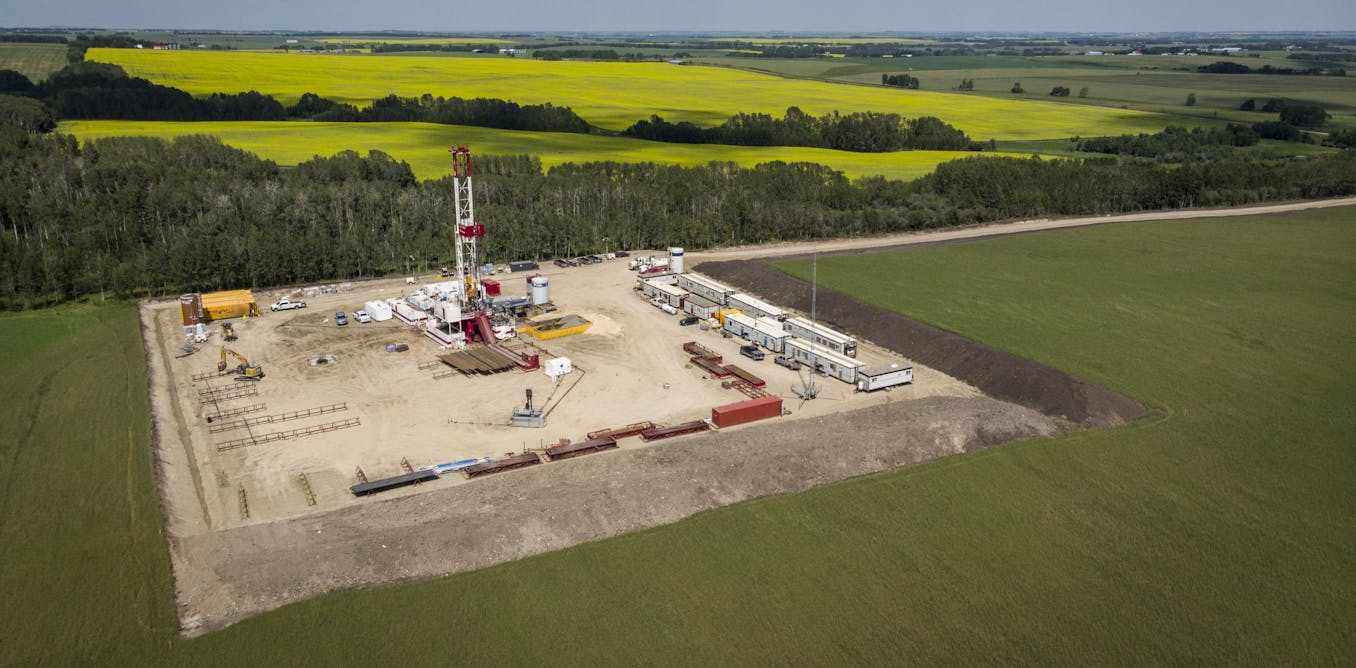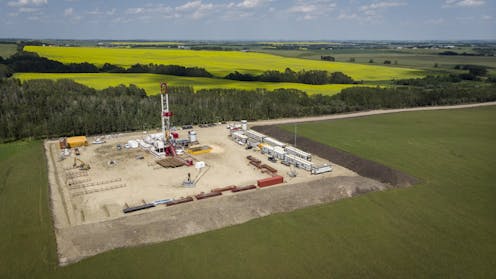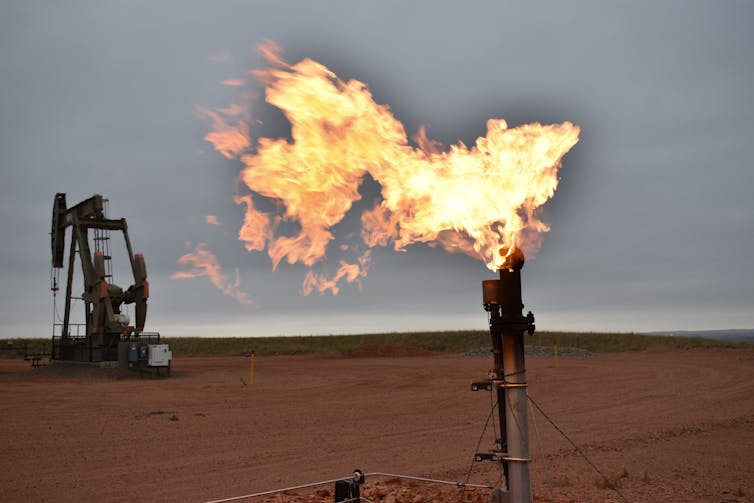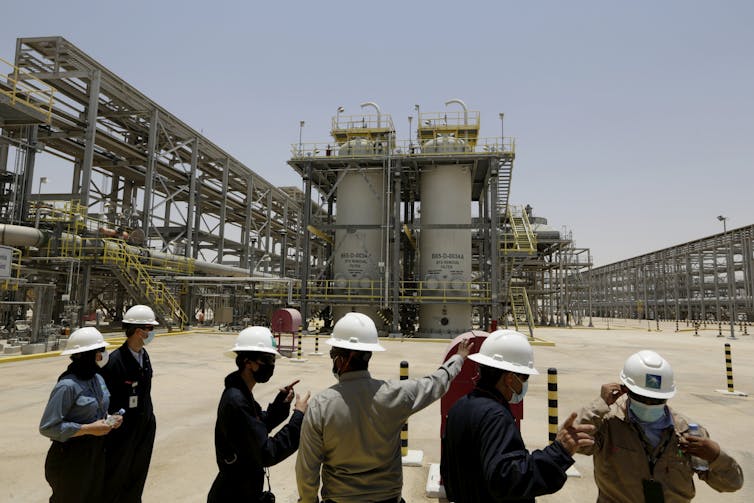As the world moves away from fossil fuels, Canada's energy security may be at risk
Canada must move away from using fossil fuels, but a transition that comes too fast could harm the economy. Policy-makers must strike a balance between energy security and economic growth.


Oil and gas prices plummeted in 2020. In March, before the World Health Organization had declared COVID-19 a pandemic, Russia and Saudi Arabia, two of the world’s largest oil producers, set off a market-share war that sent prices lower and lower.
And then, after COVID-19 had spread around the world, demand fell sharply as businesses closed and governments restricted travel. For several hours in April 2020, the price of West Texas Intermediate oil fell below zero, hitting -US$37 per barrel.
An oil-price drop, coupled with a global economic slowdown, has had adverse effects on other industries, global financial stability and non-oil-producing economies. In other words, no industry or economy is immune to these shocks. This situation prompted OPEC+ (OPEC members and 10 other oil-producing nations) to hold an emergency meeting to stabilize oil prices by reducing crude oil production.
This shift away from fossil fuels occurred quickly and unexpectedly. While the divestment movement celebrated the decrease in fossil fuel use — and the reduction in carbon emissions — these events also showed the transition to green energy still needs work.
Although Canada must move away from using fossil fuels to produce energy, a transition that comes too fast could harm Canada’s economy. Policy-makers need to strike a balance between energy security (reliable, affordable access to energy) and economic growth, but research into energy security is limited.
As an economist specializing in international finance and energy economics, I’m interested in Canada’s vulnerability to global energy markets and measures that promote Canadian energy security to ease the transition from fossil fuels to renewables.
An accelerated energy transition
Since 2008, the global oil and gas industry has suffered three oil shocks. Although the industry recovered from the shocks of 2008 and 2014, this is unlikely to be the case now.
The 2020 crisis amplified investors’ concerns about increasing environmental and political issues, and decreasing and unstable returns associated with oil and gas. New investments in the sector were placed on hold, the global energy market is resetting and the energy transition is accelerating.
Read more: Oil crash explained: How are negative oil prices even possible?
“Stranded assets risk” is one of those risks that could accelerate the energy transition. Stranded assets are the infrastructure and resources — such as drilling rigs, pipelines and oil in the ground — that are tied to fossil fuel production and aren’t near the end of their useful lives, but are no longer producing economic returns.
In 2020, major oil producers wrote off approximately US$69 billion worth of their assets, resulting in a 30 per cent decrease in upstream exploration and production investments.

The 2020 crisis revealed that an accelerated transition had the potential to severely harm Canada’s economy. A report by the Office of the Parliamentary Budget Officer in March 2020 anticipated the combination of the COVID-19 crisis and low oil prices would be unfavourable. Actual data show record-low GDP growth of -13 per cent in June 2020, a 13.7 per cent increase in unemployment in May 2020 and a rise in the federal debt-to-GDP ratio to 53.98 per cent in 2020, which is expected to reach 72.17 per cent in 2021.
Unlike previous oil shocks, the 2020 drop in oil production was steeper and faster, but the economic toll has not yet been fully evaluated. Still, the Bank of Canada warned that: “More frequent or severe extreme weather events and/or a late and abrupt transition to a low-carbon economy …” could be detrimental to Canada’s economy and financial stability.
Energy security
Policy-makers must evaluate environmental, economic and social objectives to strike a balance between energy security and economic growth. Although Canada is rich in resources, its energy security is threatened in terms of supply and demand.
Domestic regulations — like restrictions on foreign direct investment and trade facilitation, administrative burden on personally owned enterprises and the time required to obtain permits — discourage investments in the energy sector, including oil and gas, wind and nuclear energy.

Canada is also vulnerable to the dynamics of the global oil and gas market, such as decisions made by Saudi Arabia, Russia, the United States and Qatar, and to being isolated by policies like the U.S. decision to curtail pipeline construction.
Canada does not have strategic petroleum reserves — an emergency supply of oil and gas — to decrease adverse economic effects of unexpected energy supply disruptions. It relies on imports because it cannot transport enough oil and gas from the west to the east, and it suffers from pipeline politics that hinder access to international markets.
Dismissing these issues in the short term rather than finding solutions will delay the ultimate goal of facilitating a smooth long-term energy transition.
A recent RBC report found cutting oil production could undermine Canada’s ability to invest in and develop green-energy technologies, including electricity storage, nuclear energy and green hydrogen, but added that the carbon intensity of oil production had to drop quickly if we were to benefit economically.
Read more: Why green hydrogen — but not grey — could help solve climate change
Gas is a reliable and affordable energy source that may play a crucial role in the energy transition in the short term. Supporters promote gas as a clean energy source, whereas opponents claim it impedes the energy transition. To accelerate economic recovery after the 2020 crisis, governments may offer incentives to invest in the gas industry, which would boost the industry’s resilience in the long term.
On the one hand, the federal government has vowed to abandon investments in fossil fuels and to support decarbonization. On the other, it is promoting energy diversification and investments in natural gas and blue and grey hydrogen projects, which will make it harder to eliminate gas from the energy mix.
Natural gas may not be the ultimate solution to achieve energy transition, but it will remain an important energy source in the next few years.
The way forward
Although the transition away from fossil fuels is vital for Canada, Canada’s economy is not ready for an abrupt shift away from the oil and gas sector. The energy and COVID-19 crises revealed Canada’s vulnerability to the decisions of major oil and gas producers.
It’s important to build a model that examines Canada’s energy security and transition in a global context. That model needs to study the role of gas in bridging short-term and long-term energy security.
Politicization of the energy transition will directly hurt the industry and indirectly affect Canadians’ lives, defeating the purpose of implementing an economically viable energy transition process.![]()
Noha Razek does not work for, consult, own shares in or receive funding from any company or organisation that would benefit from this article, and has disclosed no relevant affiliations beyond their academic appointment.
What's Your Reaction?






























































































